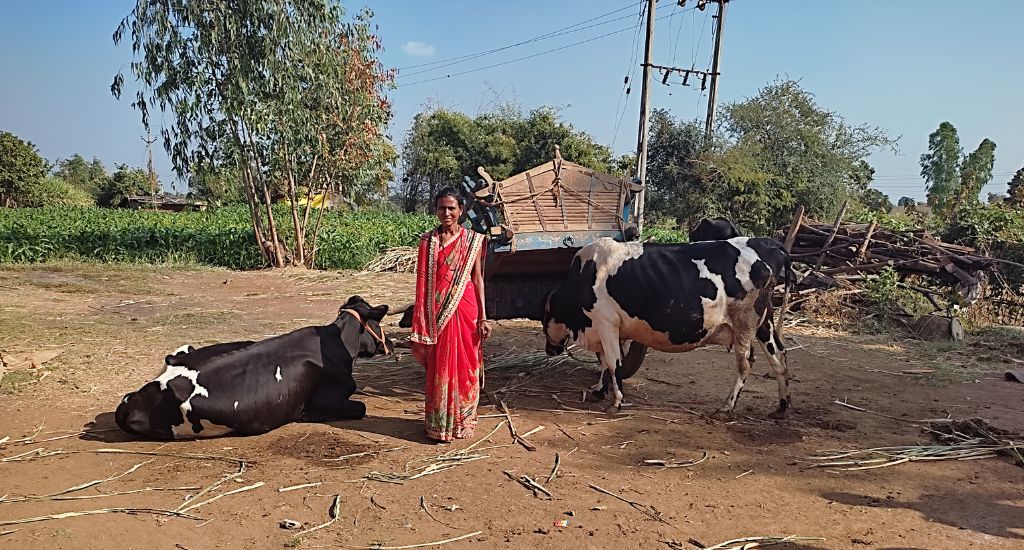
Overcoming the many hurdles to women’s inheritance rights
Prameelaben, a single child, faced many challenges on her way to claiming inheritance rights until support arrived from the local women’s collective and a grassroots organisation

Prameelaben, a single child, faced many challenges on her way to claiming inheritance rights until support arrived from the local women’s collective and a grassroots organisation
Prameelaben’s father passed away without making a will. After his death, she returned to her maternal home to take care of her mother and the family land. She started cultivating maize, cotton and some vegetables in the eight acres of land that the family had.
One day Prameelaben’s two uncles arrived in tractors and destroyed the crops. They claimed ownership of the land declaring that they were the legal inheritors of the land after their brother’s death.
What was their basis of ownership claim? Being male.
Prameelaben hails from Bhoramli village in Narmada district of Gujarat, and belongs to the Vasava tribal community. Her family’s livelihood depended heavily on the agricultural income generated through the eight acres of land her father owned.
After her marriage at the age of 19, she moved to her husband’s house. However, after her father’s death Prameelaben relocated back to her maternal home. Her in-laws supported this decision too.
Her uncle’s attack on the crops and ownership claim left her terrified and confused. Prameelaben started to look for help.
Prameelaben heard about Swabhumi Kendra (meaning ‘land owner’s centre’) during a self-help group (SHG) meeting. Swabhumi Kendra is a block-level SHG federation run by the Aga Khan Rural Support Programme India (AKRSPI), Gujarat. It works towards women’s empowerment and land ownership.

Situated in Sagbara, Narmada district, it is run by a women’s federation. AKRSPI is one of the network organisations of Mahila Kisan Adhikaar Manch (MAKAAM), an informal alliance of organisations in over 24 states of India, working for recognition and land rights of women farmers.
The Working Group of Women for Land Ownership (WGWLO) programme in Sagbara has made a huge impact too by spreading awareness and knowledge about land rights and ownership among women.
Once Prameelaben approached Swabhumi Kendra she received immediate support in registering her claim of land ownership online. She submitted a family tree (generation-wise document) and an affidavit declaring herself as the sole surviving daughter of her father.
Prameelaben could not cultivate the land as it was under litigation. Her only source of income then was her cattle. In desperate times, she had to borrow money from her neighbours as well.
During the whole legal process, which took over six months, Prameelaben was backed by the women in the federation – from visits to the lawyers, courts and revenue office to receiving financial assistance. Thanks to the support from federation members and Swabhumi Kendra, she spent only Rs. 2,000 during the whole process from documentation and transport to lawyer’s fees.
Had she gone through a lawyer directly, Prameelaben would have spent between Rs. 10,000 and Rs.15,000 during the legal process.

“Financial cost is not the only challenge. It is also intimidating for daughters to stand firm throughout the desolate journey of claiming property rights,” Prameelaben said.
“Effective and independent land rights for women are important on at least four counts – welfare, efficiency, equality and empowerment,” Bina Aggarwal, a development economist, told Village Square.
Prameelaben finally won the case against her uncles and inherited the eight acres of land. She is currently cultivating millets, gram, sugarcane, maize, paddy and vegetables on the land.
She has also received training in organic farming through the WGWLO programme, and has cultivated organic cotton recently. She is now practising sustainable agriculture in five acres of her land. Also, while she had one borewell on her land, she didn’t have a motor. She took a loan of Rs. 50,000 from the Dream Foundation and iKisan portal to purchase a pumpset.
Prameelaben now has steady income. She sells sugarcane, cotton and milk and earns about Rs 4.35 lakh annually. She also sells the surplus paddy, gram, millets and vegetables.
While inheritance rights of daughters were long recognised legally, social recognition of the rights is fraught with challenges. Prameelaben’s unyielding courage shows us the way – not only to land titles but actual control over the inherited property.
Prameelaben decided to move forward with agriculture, make investments, take risks and become independent.
The lead image shows women participating in a WGWLO meeting in Narmada, Gujarat (Photo by Jagdishbhai Gamit).
Sameera Kasulanati is a researcher at VikasAnvesh Foundation, Pune.
Kristy Saikia is a development professional, currently working as a programme specialist in monitoring and evaluation in the rural areas of south Gujarat. Spending time with the community and constantly learning new things about them has been the greatest highlight of her life.